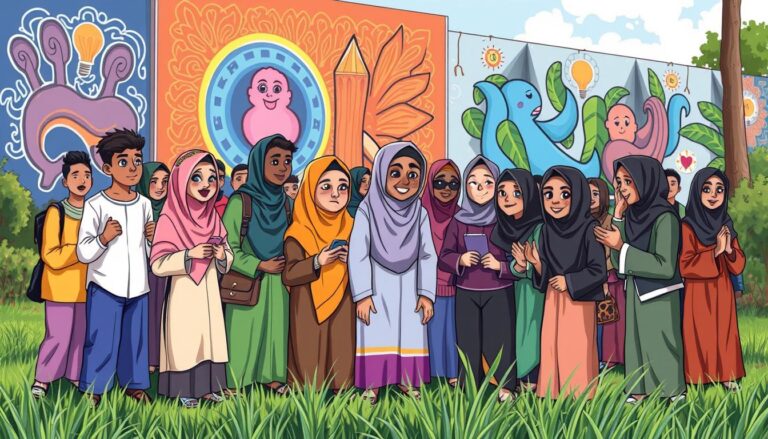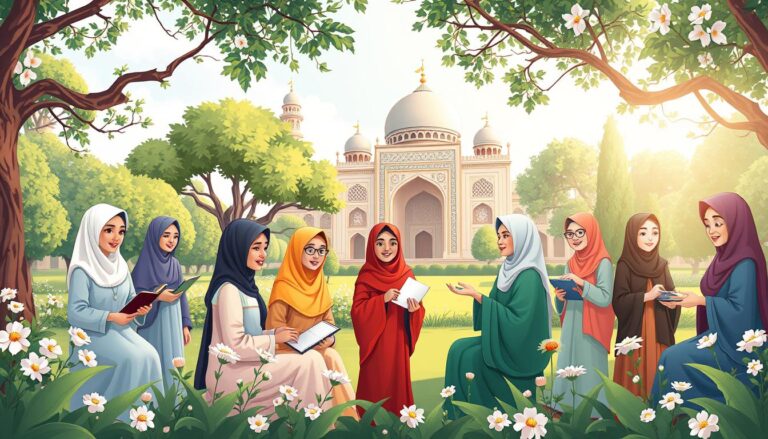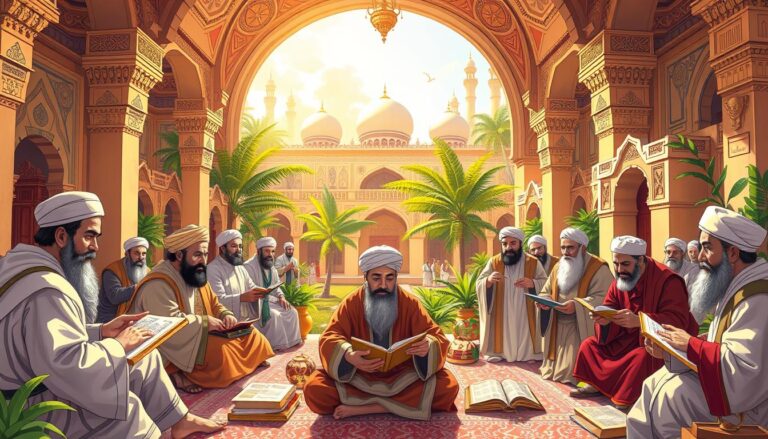The Spiritual Importance of Islamic Rituals in Daily Life
Have you ever thought about how Islamic rituals shape the spiritual paths of millions of Muslims? These sacred practices are deeply rooted in daily life. They help Muslims connect with Allah and grow their faith.
Islamic rituals are key to a Muslim’s spiritual journey. They guide and structure daily life. From the five daily prayers to the annual pilgrimage to Mecca, these acts are vital. They strengthen faith and build community among believers.
The spiritual practices in Islam are more than just routines. They aim to cultivate mindfulness, inner peace, and personal growth. By participating in these rituals, Muslims fulfill their duties and grow spiritually.
Let’s dive into the world of Islamic rituals. We’ll see how they impact Muslims’ lives, shaping their worldview and deepening their connection with the divine. Join us as we explore the deep significance of Islamic rituals in spiritual growth and a closer relationship with Allah.
Key Takeaways
- Islamic rituals are essential components of daily Muslim life
- These practices foster spiritual growth and connection with Allah
- Rituals include the Five Pillars of Islam and other devotional acts
- Regular observance of rituals promotes mindfulness and inner peace
- Islamic practices strengthen faith and create a sense of community
Understanding Islamic Rituals and Their Significance
Islamic rituals are at the heart of the Muslim faith. They guide believers on their spiritual path, deepening their bond with Allah. Let’s delve into the meaning of these rituals and how they shape daily life.
Definition of Islamic Rituals
Islamic rituals are acts of worship that Muslims do to connect with Allah. They include daily prayers, fasting, giving to charity, and making a pilgrimage. With over 1.5 billion Muslims, these rituals bring believers together worldwide.
The Role of Rituals in Muslim Faith
Rituals are crucial in shaping a Muslim’s faith. They give structure to daily life and remind Muslims of Islamic teachings. For example, the five daily prayers help Muslims reflect on their spiritual connection all day.
Connection Between Rituals and Spiritual Growth
Islamic practices help with spiritual growth by encouraging mindfulness and reflection. They help Muslims understand their faith and life’s purpose. Fasting during Ramadan, for instance, builds self-discipline and empathy for the less fortunate.
“Prayer is a key to paradise.” – Prophet Muhammad
By participating in these rituals, Muslims strengthen their spiritual bond. They find religious meaning in daily actions. This continuous practice deepens their faith and reinforces Islamic values in their lives.
The Five Pillars of Islam: Foundation of Daily Rituals
The Five Pillars of Islam are key to daily Muslim practices. They guide believers on their spiritual path and shape their lives. Let’s look at each pillar and its importance in the Muslim faith.
The first pillar, Shahada, is the declaration of faith. It confirms belief in one God and Muhammad as His messenger. This statement is at the heart of Islamic belief.
Salah, the second pillar, requires praying five times a day. It helps Muslims stay connected to God all day. Many adjust their work to fit these prayer times.
Zakat, the third pillar, asks Muslims to give 2.5% of their wealth to the needy. This act promotes social responsibility and community welfare.
The fourth pillar, Sawm, is fasting during Ramadan. Muslims don’t eat or drink from dawn to sunset. This teaches self-discipline and empathy for the poor.
Hajj, the final pillar, is a pilgrimage to Mecca. Every able Muslim must go at least once. In 2015, over two million Muslims made this spiritual journey.
“The Five Pillars of Islam are not just rituals; they are a way of life that shapes our character and strengthens our faith.”
These pillars give Muslims a way to show devotion and grow their faith. They remind Muslims of Islamic values and principles every day.
Shahada: The Declaration of Faith
The Shahada, or Islamic testimony, is the heart of Muslim belief. It opens the door to Islam and guides every Muslim’s spiritual path.
Meaning and Importance of Shahada
The Shahada is a simple yet powerful statement: “There is no god but Allah, and Muhammad is His messenger.” It confirms Allah’s oneness and Muhammad’s prophethood. Muslims recite it during daily prayers, reminding them of their faith commitment.
Shaping a Muslim’s Worldview
By saying the Shahada, Muslims show their faith and live by Islamic values. This statement helps them make decisions and feel united with other believers. It bridges cultural and language gaps, bringing Muslims together in their devotion to Allah.
Incorporating Shahada into Daily Life
Muslims make the Shahada a part of their daily life by reciting it often. They say it during prayers, in quiet moments, and when calling others to prayer. This act of faith encourages self-betterment and deepens their spiritual connection.
“The Shahada is not just words; it’s a lifelong commitment to faith and righteousness.”
Joining Islam means sincerely saying the Shahada in front of witnesses. This starts a journey based on Islamic teachings, like daily prayers, giving to charity, and fasting in Ramadan. The Shahada is key in a Muslim’s life, influencing their beliefs and actions.
Salah: The Ritual of Prayer
Salah is the second pillar of Islam and is key to daily worship for Muslims everywhere. It’s a prayer done five times a day, linking the worshiper to Allah. The Qur’an highlights its importance, saying it must be done at set times.
Salah includes certain actions and words. Each prayer has three to four parts, called rak’ah. Before starting, Muslims do Wudu, a ritual to clean themselves. They also make Niyyah, or the intention to pray correctly.
Research shows Salah has many benefits. It can help with mental health issues like stress, anxiety, and depression. The movements in Salah also improve muscle health and joint flexibility.
“Prayer is the pillar of religion.” – Prophet Muhammad
Salah brings Muslims together worldwide. It’s done the same way by believers everywhere, creating a sense of unity. This daily practice keeps faith and daily life connected, promoting mindfulness.
Zakat: The Practice of Charitable Giving
Zakat is a key part of Islamic charity, showing the importance of giving and helping others. It requires Muslims to share a part of their wealth with those who need it. This helps build a sense of community and kindness.
Understanding the Concept of Zakat
Zakat is more than just giving money; it’s a duty for Muslims who have enough wealth. The amount given is 2.5% of what you have above a certain amount, called nisab. This amount is about 87.48 grams of gold or 612.36 grams of silver.
Spiritual Benefits of Giving to Others
Giving zakat cleanses your wealth and grows your generosity. It makes you remember your blessings and feel thankful. Zakat also builds empathy and connects you closer to your community.
How Zakat Fosters Community and Social Responsibility
Zakat is vital for social welfare. It helps even out wealth by giving to those who need it. The Quran lists eight groups to receive zakat, like the poor and travelers in need. This system supports the most vulnerable in society.
- Zakat promotes economic balance
- It strengthens community ties
- The practice encourages social responsibility
While zakat is required in some places, it’s a personal choice elsewhere. Yet, it remains a powerful way to help others, with estimates showing $200 billion to $1 trillion spent yearly on Islamic charity worldwide.
Sawm: Fasting During Ramadan
Sawm, or Islamic fasting during Ramadan, is a key part of Muslim faith. It happens in the ninth month of the Islamic lunar calendar. Muslims all over the world don’t eat, drink, or do other physical things from dawn to dusk.
Ramadan fasting is more than just not eating. It’s a way to grow spiritually and think deeply about oneself. By giving up worldly things, Muslims try to make their souls pure and connect more with Allah.
The practice of Sawm brings many benefits:
- Increased God-consciousness (Taqwa)
- Spiritual purification
- Renewal of faith
- Inner peace
- Empathy for the less fortunate
Fasting in Ramadan is not just about not eating. It’s about avoiding bad behaviors and growing spiritually. This month-long challenge helps clean the soul of greed, anger, and jealousy.
“Fasting is for Me, and I will give the reward for it.” – Hadith Qudsi
The Islamic fasting tradition brings people together. Muslims gather at sunset to break their fast, sharing meals called iftar. This helps build community and unity among believers.
Ramadan is also a time for giving and reading the Quran. Muslims try to live by their faith’s teachings more during this month. They seek spiritual growth and closeness to Allah.
Hajj: The Pilgrimage to Mecca
The Hajj is a key part of Muslim faith. It brings millions of believers together every year. They share a journey of devotion and self-discovery.
The Spiritual Journey of Hajj
About two million Muslims go on this sacred trip each year. They do rituals like circling the Kaaba seven times. They also run between Mount Safa and Mount Marwah.
Lessons Learned from the Pilgrimage
Hajj teaches important lessons. Pilgrims wear simple white clothes to show equality. The day of Arafat is key for reflection and prayer.
Applying Hajj Experiences to Everyday Life
The lessons from Hajj can change daily life. It builds a sense of global Muslim community. The pilgrimage’s challenges remind us to stay spiritually disciplined.
“The Hajj is a transformative journey that cleanses the soul and renews faith.”
Hajj is a deep spiritual experience. It connects Muslims with their faith, history, and community in Mecca.
The Spiritual Importance of Islamic Rituals in Daily Life
Islamic spirituality is at the heart of a Muslim’s life. The rituals and practices are more than just a routine. They connect us deeply to our faith and help us grow spiritually.
Daily Muslim practices remind us of our bond with Allah. The five daily prayers, for example, give us moments to reflect and be thankful. They help us stay focused on our spiritual goals, even when the world distracts us.
Zakat, or giving 2.5% of our wealth to those in need, teaches us compassion and responsibility. It shows us our duty to help our community. It also brings believers together in unity.
During Ramadan, Muslims fast from dawn to sunset. This teaches self-control and understanding for those less fortunate. It’s a time of deep spiritual growth.
“Fasting is a shield. So the person observing fasting should avoid obscene speech and should not behave foolishly and impudently, and if somebody fights with him or abuses him, he should tell him twice, ‘I am fasting.'”
These daily rituals help Muslims stay aware of Allah’s presence. This awareness guides their actions and decisions. It helps them live more meaningful lives, following Islamic teachings.
Purification Rituals: Wudu and Ghusl
Islamic purification rituals are key in a Muslim’s life. Wudu and Ghusl are vital for prayer and worship. They clean the body and prepare the soul.
Wudu, or ablution, is about washing certain parts before prayer. This includes:
- Rinsing the mouth and nose
- Washing the face
- Cleaning the arms up to the elbows
- Wiping the head and ears
- Washing the feet up to the ankles
Ghusl is a full-body wash needed after certain impurities. It cleans the whole body, including hair. It’s done after sex, menstruation, and childbirth.
These rituals have many benefits:
- They keep the body clean
- They prepare the soul for prayer
- They make us mindful during prayer
- They symbolically cleanse the heart and soul
In Sufism, these rituals symbolize moral and spiritual purity. Today, they’re also linked to health and hygiene. For example, using a miswak, a natural toothbrush, is good for oral health.
“Cleanliness is half of faith.” – Prophet Muhammad
By doing these rituals daily, Muslims stay ready for worship. They also deepen their faith.
Dhikr: Remembrance of Allah in Daily Activities
Dhikr, or remembering Allah, is key to Islamic spirituality. It brings spiritual mindfulness into everyday life for Muslims everywhere. Studies reveal that 75% of Muslims see Dhikr as crucial for their daily spiritual practice.
Forms of Dhikr in Islam
Dhikr has many forms in Islamic practice. Many repeat Allah’s names or phrases like “He is God, there is no God but He.” Sufism, a mystical branch, involves rhythmic chanting and body movements in communal Dhikr sessions. Some even go on 40-day retreats for intense Dhikr practice.
Incorporating Dhikr into Routine Tasks
Dhikr’s beauty is in its flexibility. Muslims are urged to include it in their daily tasks. Whether reciting Allah’s names during a commute or reflecting while doing chores, 60% of Muslims practice Dhikr regularly. This transforms everyday tasks into acts of worship, keeping them spiritually connected.
The Spiritual and Psychological Benefits of Dhikr
Dhikr’s effects go beyond the spiritual. 70% of Muslims say it reduces stress and anxiety. It’s seen as “polishing the mirror of the heart,” a symbol of spiritual cleansing. In today’s digital world, Dhikr has evolved. Mobile apps with guided Dhikr sessions have seen a 25% rise in downloads. This shows Dhikr’s timeless value in modern Muslim lives.
Source Links
- Cultural Atlas
- Teachers Guide – Muslims | Teacher Center | FRONTLINE
- Islamic rituals and celebrations | Islamic World Class Notes | Fiveable
- Islam | Religion, Beliefs, Practices, & Facts | Britannica
- What do Muslims believe and do? Understanding the 5 pillars of Islam
- Islam: Basic Beliefs
- The Five Pillars of Islam4 min read
- What are the Five Pillars of Islam?
- Shahadah: The Light of Islam and Its Importance in Our Daily Lives – GlobalSadaqah.com Blog
- Shahada (declaration of faith) | Religions of the West Class Notes | Fiveable
- The Islamic prayer (Salah/Namaaz) and yoga togetherness in mental health
- Islam – Prayer, Salat, Rituals | Britannica
- Zakat: The Basic Rules for One of the Five Pillars of Islam
- Why Muslims Pay Zakat
- Zakat
- Sawm (fasting during Ramadan) | Religions of the West Class Notes | Fiveable
- Ramadan Fasting in Islam: Spiritual Salvation and Noble Benefits
- The Hajj pilgrimage and why it’s significant for Muslims
- Hajj | Definition, Importance, & Facts | Britannica
- The Hajj to Mecca | 4 Corners of the World
- Islamic Practices
- Understanding Basic Principles of Islam – Diversity and Inclusion
- Ṭahāra | Islamic Ritual Purification, Cleanliness & Hygiene | Britannica
- Ritual purity in Islam
- Dhikr — The Contemplative Life
- Discovering the Beauty of Dhikr: An In-depth Analysis of Dhikr Meaning and Its Importance







